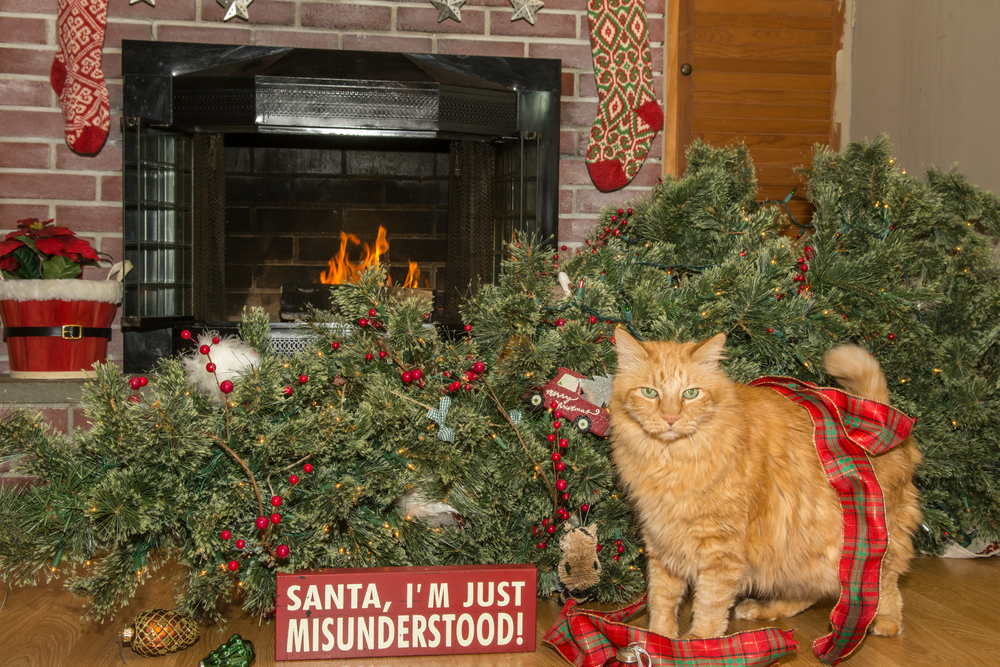4 Pawlidays Pet Safety Tips

’Tis the season for giving, special sweets, and twinkling tree lights. Holiday celebrations wouldn’t be the same without including our furry family members. However, holiday treats and festive decor can be hazardous to your pets and lead to upset stomachs and accidents. Avoid an unexpected trip to the animal emergency room by following these four holiday safety tips from your Bayside Animal Hospital veterinary team.
#1: Keep pets calm and carry on
Holiday gatherings may be smaller this year, but the excitement and preparations are as big. From kitchen chaos, to holiday music, to crackling fires, these new sights and smells can be stressful to pets, including those who are typically laid back or calm. Avoid behavioral outbursts or accidents by maintaining your pet’s regular exercise and playtime routines. Special toys and treats are also a great way to keep your pet distracted and calm during the festivities. Use these treats as positive reinforcement for good behavior, such as staying clear of the kitchen and holiday decor. During meal and party times, designate a pet-safe room or crate where your pet will be comfortable and away from the chaos. Play soft music to help keep them calm. For extra anxious pets, consider using a pheromone such as Adaptil or Feliway to encourage relaxation and provide a calm environment.
#2: Just say “No” to begging and counter surfing pets
During meal preparations, ensure the kitchen is off-limits to all four-legged family members. Common holiday dishes, as well as discarded wrappers and scraps, can cause many pet emergencies. Rich, fatty foods are difficult for pets to digest and can lead to gastrointestinal (GI) distress and inflammation, including pancreatitis, a potentially deadly inflammatory condition that can cause vomiting, diarrhea, lethargy, and dehydration. Never feed your begging pet the following:
- Onions, garlic, chives and leeks — Members of the Allium family are toxic to pets, especially cats and Japanese dog breeds. Small amounts can cause life-threatening anemia and red blood cell breakdown. Clinical signs may occur several days after ingestion, including panting, high heart rate, GI upset, and blood in the urine.
- Raisins and grapes — As few as four raisins or grapes can be toxic to some dogs, leading to kidney failure. Clinical signs can occur up to two hours after ingestion and include vomiting, diarrhea, lethargy, tremors, and excess urination.
- Sage, spices, and herbs — These flavorings can be toxic, especially to cats, and result in GI upset or central nervous system depression.
- Yeast rolls — Eating unbaked dough or raw rolls can result in painful gas or, in severe cases, intestinal bloating.
- Corn cobs — Corn cobs are difficult to chew, and can result in dogs swallowing them whole, leading to GI blockage or tears.
- Casseroles — Most casserole dishes contain heavy cream or other milk-based products. Animals lack sufficient lactase, which is the enzyme needed to properly digest dairy products, and eating any milk-based product can cause GI upset and diarrhea.
- Chocolate — All chocolates, especially dark and baker’s chocolate, contain the stimulants caffeine and theobromine, which can be deadly to dogs. Clinical signs include vomiting, diarrhea, hyperactivity, elevated heart rate, and possible death.
- Sugar-free treats — Xylitol is present in many sugar-free foods, and in some peanut butters. Small amounts can be toxic and cause liver failure, seizures, and death in some cases.
- Alcohol — Foods or beverages containing alcohol can cause a variety of symptoms, including vomiting, diarrhea, difficulty breathing, tremors, or death.
#3: Beware of holiday decor that’s dangerous to pets
Festive plants, trees, and candles transform our homes into a holiday wonderland. However, ensure that wagging tails and curious cats never have access to lighted candles, to prevent house fires or burnt fur. Avoid using scented candles or potpourri that contain essential oils, especially these varieties. Their toxic effects include coughing, difficulty breathing, seizures, and possible death. Use caution when putting up Christmas trees, as many pets will want to investigate the colorful ornaments and branches. To prevent tipping trees and pet injuries, secure your tree to a ceiling or doorway using fishing line. When decorating, ensure that fragile, dangling ornaments, as well as handmade—especially salt-dough ornaments—are out of paws’ reach. If tinsel is your preferred tree adornment, ensure that it’s completely out of your pet’s reach. Tinsel is a common culprit for many cat emergencies, leading to intestinal blockages that often require surgical removal.
For many years, poinsettia plants were thought to be deadly to animals and children. While no longer considered deadly unless large amounts are consumed, the sap in poinsettia leaves can irritate the mouth and throat. Additionally, ingesting the leaves will likely cause your pet to become nauseated and vomit. In addition to poinsettia plants, the following holiday plants are toxic to your pets:
- Amaryllis
- Mistletoe
- Balsam
- Pine
- Cedar
- Holly
#4: Plan ahead for pet emergencies
In the weeks leading up to holiday celebrations, ensure your pet’s microchip contact information is current. Additionally, always keep an identifiable collar or tag on your pet for quick identification, should they take an unplanned adventure. Despite your best efforts, mischievous pets can still get into trouble. To avoid added stress, always keep the ASPCA Poison control number, Bayside Animal Hospital’s number, and the closest animal emergency hospital number and address in a visible, easily accessible location.
Our Bayside Animal Hospital team wishes you and your family a happy and safe holiday season. If your pet gets too up close and personal with your holiday celebrations, or you have any other pet questions or concerns, call our office. We are always happy to help you and your furry family members.


